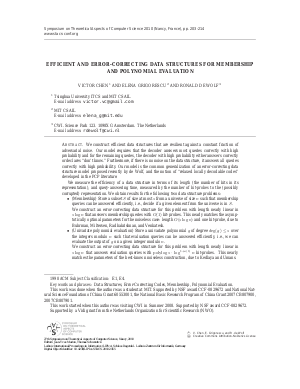Efficient and Error-Correcting Data Structures for Membership and Polynomial Evaluation
Authors Victor Chen, Elena Grigorescu, Ronald de Wolf
-
Part of:
Volume:
27th International Symposium on Theoretical Aspects of Computer Science (STACS 2010)
Part of: Series: Leibniz International Proceedings in Informatics (LIPIcs)
Part of: Conference: Symposium on Theoretical Aspects of Computer Science (STACS) - License:
 Creative Commons Attribution-NoDerivs 3.0 Unported license
Creative Commons Attribution-NoDerivs 3.0 Unported license
- Publication Date: 2010-03-09
File

PDF
LIPIcs.STACS.2010.2455.pdf
- Filesize: 130 kB
- 12 pages
Document Identifiers
Subject Classification
Keywords
- Data Structures
- Error-Correcting Codes
- Membership
- Polynomial Evaluation
Metrics
- Access Statistics
-
Total Accesses (updated on a weekly basis)
0Document
0Metadata
Abstract
We construct efficient data structures that are resilient against
a constant fraction of adversarial noise. Our model requires that
the decoder answers \emph{most} queries correctly with high probability and for the remaining queries, the decoder with high probability either answers correctly or declares ``don't know.'' Furthermore, if there is no noise on the data structure, it answers \emph{all} queries correctly with high probability. Our model is the common generalization of an error-correcting data structure model proposed recently by de~Wolf, and the notion of ``relaxed locally decodable codes'' developed in the PCP literature.
We measure the efficiency of a data structure in terms of its \emph{length} (the number of bits in its representation), and query-answering time, measured by the number of \emph{bit-probes} to the (possibly corrupted) representation. We obtain results for the following two data structure problems:
\begin{itemize}
\item (Membership) Store a subset $S$ of size at most $s$ from a universe of size $n$ such that membership queries can be answered efficiently, i.e., decide if a given element from the universe is in $S$. \\
We construct an error-correcting data structure for this problem with length nearly linear in $s\log n$ that answers membership queries with $O(1)$ bit-probes. This nearly matches the asymptotically optimal parameters for the noiseless case: length $O(s\log n)$ and one bit-probe, due to Buhrman, Miltersen, Radhakrishnan, and Venkatesh.
\item (Univariate polynomial evaluation) Store a univariate polynomial $g$ of degree $\deg(g)\leq s$ over the integers modulo $n$ such that evaluation queries can be answered efficiently, i.e., we can evaluate the output of $g$ on a given integer modulo $n$. \\
We construct an error-correcting data structure for this problem
with length nearly linear in $s\log n$ that answers evaluation queries
with $\polylog s\cdot\log^{1+o(1)}n$ bit-probes. This nearly matches
the parameters of the best-known noiseless construction, due to Kedlaya and Umans.
\end{itemize}
Cite As Get BibTex
Victor Chen, Elena Grigorescu, and Ronald de Wolf. Efficient and Error-Correcting Data Structures for Membership and Polynomial Evaluation. In 27th International Symposium on Theoretical Aspects of Computer Science. Leibniz International Proceedings in Informatics (LIPIcs), Volume 5, pp. 203-214, Schloss Dagstuhl – Leibniz-Zentrum für Informatik (2010)
https://doi.org/10.4230/LIPIcs.STACS.2010.2455
BibTex
@InProceedings{chen_et_al:LIPIcs.STACS.2010.2455,
author = {Chen, Victor and Grigorescu, Elena and de Wolf, Ronald},
title = {{Efficient and Error-Correcting Data Structures for Membership and Polynomial Evaluation}},
booktitle = {27th International Symposium on Theoretical Aspects of Computer Science},
pages = {203--214},
series = {Leibniz International Proceedings in Informatics (LIPIcs)},
ISBN = {978-3-939897-16-3},
ISSN = {1868-8969},
year = {2010},
volume = {5},
editor = {Marion, Jean-Yves and Schwentick, Thomas},
publisher = {Schloss Dagstuhl -- Leibniz-Zentrum f{\"u}r Informatik},
address = {Dagstuhl, Germany},
URL = {https://drops.dagstuhl.de/entities/document/10.4230/LIPIcs.STACS.2010.2455},
URN = {urn:nbn:de:0030-drops-24558},
doi = {10.4230/LIPIcs.STACS.2010.2455},
annote = {Keywords: Data Structures, Error-Correcting Codes, Membership, Polynomial Evaluation}
}
